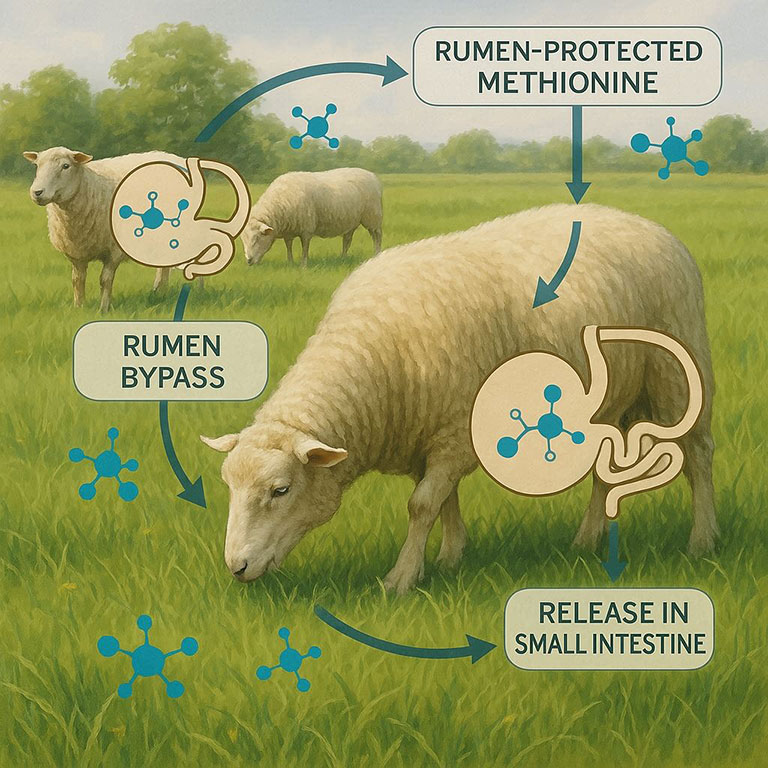The Effects of Rumen Protected Methionine in Ewes
The Effects of Rumen Protected Methionine on Reproductive and Immune Performance in Ewes
A 2025 Review
Abstract
Rumen-protected methionine (RPM) helps ensure that the essential amino acid methionine reaches the small intestine, avoiding ruminal degradation and enhancing absorption. The 2025 study by Kotsampasi et al. in Veterinary Sciences (Vol. 12, Issue 8) assessed the effects of maternal supplementation with RPM—alone or in combination with rumen-protected choline (RPC) and betaine (RPB)—during the periconceptional and prepartum periods in Chios ewes. Key outcomes included enhanced maternal antioxidant capacity (e.g., increased FRAP activity), improved embryonic development, and elevated birth weights among offspring. These findings underline the importance of fortified methyl donor nutrition during critical gestational windows for optimizing reproductive success and neonatal growth. RPM, particularly when paired with RPC and RPB, may thus be a valuable strategy in precision sheep nutrition.
What Is Rumen Protected Methionine?
Methionine is an essential amino acid necessary for protein synthesis, methyl group donation, and antioxidant defense. In ruminants, dietary methionine can be degraded in the rumen before absorption. To address this, RPM is formulated to bypass rumen degradation and release methionine in the small intestine, where it can be absorbed and utilized efficiently.
One advanced example of such a product is Methpropars, a high-quality Rumen Protected Methionine developed to meet the specific nutritional demands of high-yielding dairy and meat-producing ruminants. With its precise coating technology, Methpropars ensures superior intestinal release and bioavailability.
Study Overview: Purpose and Design
The 2025 study aimed to evaluate the effects of supplementing ewes with a combination of RPM, rumen-protected choline, and betaine during the mating season on reproductive performance, antioxidant status, and immunity.
- Subjects: 120 ewes
- Groups: Control, RPM only, RPM + choline, RPM + choline + betaine
- Duration: 90 days
- Parameters measured: Pregnancy rate, litter size, serum antioxidant capacity, white blood cell counts, liver function indicators
These experimental designs are crucial in validating commercial products like Methpropars, which are developed under rigorous quality control to deliver consistent performance across various physiological stages.
Key Findings on Reproductive Performance
The study revealed significant benefits of RPM supplementation:
- Pregnancy Rate: Increased by 14% in the RPM group compared to the control.
- Litter Size: Increased number of twin pregnancies in RPM + choline and RPM + choline + betaine groups.
- Fetal Viability: Higher survival rate of fetuses in treated groups.
These improvements indicate enhanced uterine environment and embryo development, possibly due to increased methionine availability and better methylation status. Products such as Methpropars, which are engineered to deliver methionine precisely where it’s needed, are ideally suited to support these reproductive gains.
Effects on Immune System and Antioxidant Status
Methionine plays a role in synthesizing glutathione, a major cellular antioxidant. The inclusion of RPM improved the antioxidant status:
- Increased Total Antioxidant Capacity (TAC) in serum
- Reduced Malondialdehyde (MDA) levels, indicating lower lipid peroxidation
- Higher White Blood Cell (WBC) counts, suggesting enhanced immune responsiveness
Moreover, choline and betaine provided additional methyl groups, supporting hepatic function and further strengthening immune capacity.
It is worth noting that Methpropars also contributes to enhanced immune resilience, especially during stressful periods like transition and reproduction, owing to its highly bioavailable methionine content.

Liver Function and Metabolic Support
RPM supplementation was associated with better liver enzyme profiles:
- Lower AST and ALT levels, reflecting reduced hepatic stress
- decreased blood urea nitrogen (BUN) levels, indicating better nitrogen utilization
These findings highlight the metabolic advantages of protected methionine, especially under reproductive and metabolic stress. Methpropars is formulated not only to meet methionine requirements but also to optimize liver and metabolic health through its unique cellulose-coated delivery matrix.
Why RPM Is Critical for Ewe Nutrition
During mating and gestation, ewes have elevated nutrient requirements. Methionine is often the first limiting amino acid, and its deficiency can impair reproduction and immune defenses. By supplying methionine directly to the small intestine, RPM:
- Enhances protein synthesis
- Supports methylation processes critical
- Improves antioxidant defenses
Methpropars addresses these demands through a specialized formulation that ensures reliable bypass from rumen degradation, making it an ideal choice for improving reproductive outcomes.
Combination with Choline and Betaine
Choline and betaine are methyl donors like methionine. Their rumen-protected forms allow synergistic effects when combined with RPM:
- Choline supports phospholipid synthesis and lipoprotein metabolism
- Betaine acts as an osmoprotectant and methyl group donor
This combination amplifies the benefits of methionine, leading to improved reproductive outcomes and reduced oxidative stress. When used alongside Methpropars, this nutrient synergy can be fully leveraged in strategic feeding programs.
Practical Recommendations for Sheep Producers
Based on this study, here are actionable insights:
- Supplement RPM during breeding and early gestation.
- Combine RPM with protected choline and/or betaine for optimal reproductive and immune function.
- Monitor antioxidant and liver health markers to evaluate metabolic improvements.
To achieve these goals effectively, producers can rely on high-quality RPM products like Methpropars, designed to support fertility, immunity, and efficient nutrient utilization.
Conclusion
The 2025 study by Kotsampasi et al. adds to the growing body of evidence supporting the use of Rumen Protected Methionine in ruminant nutrition. For ewes, especially during the critical reproductive period, RPM improves pregnancy rates, enhances immune competence, and supports liver function. The synergistic effects with choline and betaine make it a powerful tool in precision sheep nutrition.
Livestock nutritionists and producers should strongly consider RPM as part of their reproductive management strategy to achieve better productivity and animal health outcomes. Among available solutions, Methpropars stands out as a scientifically backed and industry-proven RPM source, contributing to healthier, more productive flocks.
FAQ(The Effects of Rumen Protected Methionine in Ewes):
What is rumen-protected methionine (RPM) and why is it important for ewes?
RPM is a specially coated form of methionine designed to bypass rumen degradation and be absorbed in the small intestine. For ewes, especially during breeding and gestation, it helps meet increased amino acid requirements, supporting reproduction, immune function, and metabolic health.
How does RPM improve reproductive performance?
By delivering methionine directly to the small intestine, RPM supports protein synthesis, DNA methylation, and antioxidant defenses—key processes for embryo development and fetal survival. The 2025 study showed higher pregnancy rates and more twin births in supplemented ewes.
Can RPM improve immune function in ewes?
Yes. Methionine is essential for producing glutathione, a powerful antioxidant, and for supporting white blood cell activity. Supplementation increases antioxidant capacity and immune responsiveness, reducing oxidative stress.
Why combine RPM with rumen-protected choline and betaine?
Choline and betaine act as additional methyl donors, enhancing methionine’s effects. Their combination with RPM improves liver function, boosts reproductive outcomes, and provides better protection against oxidative damage.
When should RPM be supplemented in ewes?
The most beneficial periods are during breeding and early gestation, when nutrient demands are highest and reproductive processes are most sensitive to methionine availability.
Is Methpropars suitable for sheep as well as cattle?
Yes. While Methpropars is widely used in high-producing dairy cattle, its precise coating technology and high intestinal bioavailability also make it effective for improving reproductive and immune performance in ewes.
How can sheep producers measure the benefits of RPM supplementation?
Producers can track reproductive rates, litter sizes, lamb birth weights, and blood markers such as antioxidant capacity and liver enzymes to assess improvements.
Useful content(The Effects of Rumen Protected Methionine in Ewes):


